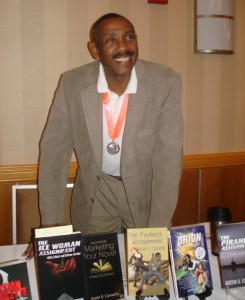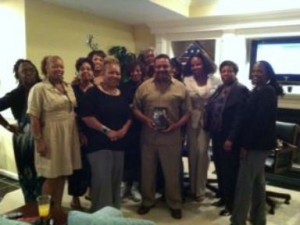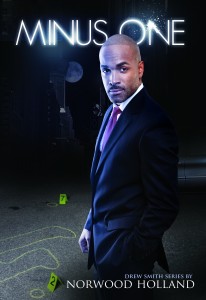A conversation with adventure novelist Austin Comacho
February 4, 2013
[jwplayer config=”Custom Player” mediaid=”1899″]
I managed to steal Austin Comacho away from his busy schedule for a few minutes to discuss his prodigious writing, the result of which is the authorship of eight novels, five in the Hannibal Jones mystery series, and three in the Stark & O’Brien adventure series. I recently read his soon-to-be released The Ice Woman. It’s a great read and I’ve come to the conclusion Austin Comacho, you are a true to form adventure novelist. And I’ll go so far to say that if Pamela Samuels Young is the black John Gresham then that makes you, Austin Comacho, the black Clive Cussler. The Ice Woman is fast paced and chalked with action and suspense. At times I was forced to put it down just to catch my breath. Austin Comacho is a member of the Mystery Writers of America and several of his short stories have been anthologized. Austin, thank you for allowing me this time.
Austin: Well, thank you very much for inviting me.
Norwood: I want to start out by asking you to share your writing journey; when, where, and how, and how it all began?
Austin: Around 2000 or so I was writing my first novel, The Troubleshooter, which although it evolved into a mystery series that book itself is really more of a thriller. The book that I started with came about because I read a lot of action, adventure, mystery kind of stuff, and I just wanted to be a part of all of that, and I enjoyed the reading so much I needed to try writing. I wrote the novel, I sent it to dozens of publishers and agents and so forth. And after a while I got frustrated and just decided that I would try to do this new, at that time, new thing called print on demand publishing. I did that for a little while and then I self-published for a little while until a couple of small publishers picked me up. And as long as I kept producing books that would sell they kept taking them. So it’s been an exciting journey for me. 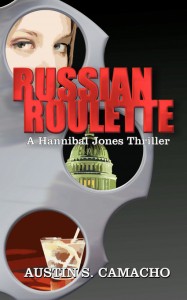
Norwood: Wow! I’m glad you kind of gave up and didn’t wait around to find an agent or a publisher. I think stepping out on your own sometimes is the best answer.
Austin: I’ve learned from my own personal experience books get rejected by publishing companies for a variety of reasons having nothing to do with how good they are. And sometimes you have to jump out there and prove yourself before a publisher wants to take a chance with you.
Norwood: You’re absolutely right. Now tell us a little bit about the Hannibal Jones Mysteries, particularly Hannibal Jones.
Austin: Well, Hannibal Jones is an African American private eye working in the Washington D.C. and Baltimore area. And when I conceived the character I had been reading a lot of the older Hardboiled Detective fictions. I read a lot of Raymond Chandler and Dashiell Hammett and those guys. I decided I wanted to have a character who was in that mold only at that time 20th century African American person which just made everything different.
Norwood: Yes it does.
Austin: And I’ve pursued the character. He’s kind of a conservative guy, kind of a hard headed guy who sees himself as a hero. But over the years I think he had modernized a little bit. He has grown and become more of a brother of today.
Norwood: And in the same vein you have Morgan Stark. Now both these characters are sort of both strong jawed, fearless men. Tell us a little bit about Morgan Stark.
Austin: Well, Morgan is a little bit less sophisticated perhaps than Hannibal Jones is. Morgan Stark is an adventurer at the heart. He’s one of those guys who’s always looking for the next excitement. He was in the army for a while, came out of the army, became a mercenary soldier, and I know a lot more about these characters than I ever tell people. But at one time or another Morgan has hustled pool in Philly. He has flown mining surveys in Alaska. He has led safaris for big game hunting. He’s done a lot of cool stuff, and he’s finally getting to that point in life where he might want to settle down a little bit, which is why he formed this business in California as a private security consultant and that’s where all those adventures take off from.
Norwood: Talk about his romantic interest because he has a partner, Felicity O’Brien, the red headed Irish firebrand, while Morgan also has a love interest, Claudette, the French woman.
Austin: Exactly right! Morgan and Felicity has a situation where they are best friends but they’re not romantically linked. And I think that was important to my story to show that the guy and the gal could be partners without having to jump in bed. Morgan has a long running relationship Claudette Kristoff who is, hmm, I guess you would Claudette an information broker. So she is kind of a private spy so to speak. And Morgan and Claudette both travel a lot so they hook up when they can.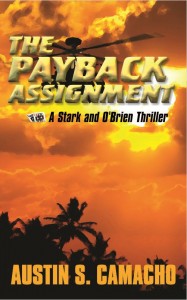
Norwood: Ah okay! Now is she of Haitian descent or is she…
Austin: She is Haitian, not of Haitian descent, she is actually Haitian. I just found that to be very exciting and exotic kind of a woman to put him together with.
Norwood: Your books span the globe and you have scenes from all the over, which is really good. I want to talk about your research. Particularly Morgan Stark, I take it he was inspired by someone you knew in your military experience. But how do you go about doing your research for all his mercenary missions?
Austin: Morgan is kind of an amalgam of people I’ve known during my military time. I was not any kind of a Special Ops person but I was a journalist in the military. And because of the clearance that I had to have it put me in contact with a lot of the guys who really do that kind of stuff. And when you start hanging out with the intelligence community people always have interesting stories to tell. And I just kind of have soaked up a lot of what they said and I still have good friends that I can turn to for the details of the craft of what they actually do. On the other hand – go ahead.
Norwood: No, that’s what I wanted to know. You bring such authenticity to your work. Where do you get such details? I think you just explained that but go ahead.
Austin: A lot of that detail comes from personal contact, people I know who can’t really talk about exactly their missions and what they did, but they do love to talk about how you do it and what their life is like in that that separate world. And I do my best to bring that authentically to the field. In popular mainstream literature you see an awful lot of white guys out there as this kind of adventurer. But the truth is that most of this kind of action takes place in Africa and South America. And most of the guys that are doing this under cover are a good deal darker than the guys you see in the movies.
Norwood: Really?
Austin: Yeah.
Norwood: About your technique, when you sit down and write a novel are you consciously aware of the plot before you begin the novel or do you discover it as you write?
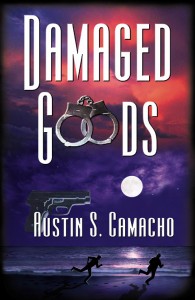 Austin: I am not at all a seat of the pants kind of a writer. I am a detailed outline kind of guy. It’s very important to me that the action flow in a certain way and so yes, before I sit down to compose I know exactly everything that is supposed to happen and in what order. I have a series of scenes plotted out.
Austin: I am not at all a seat of the pants kind of a writer. I am a detailed outline kind of guy. It’s very important to me that the action flow in a certain way and so yes, before I sit down to compose I know exactly everything that is supposed to happen and in what order. I have a series of scenes plotted out.
Norwood: Okay, so this whole idea of raising the stakes it well planned before you even write the first sentence.
Austin: Absolutely! And I think you will see that in my stories there is always a natural flow to the hero’s job. It looks difficult but manageable and he launches into it to find its much more complicated– the problem is much bigger than he thought it was and much more challenging. And that’s part of what I think makes an exciting story when I’m reading.
Norwood: The setting and the scenes vary. So does the setting play a major part in the development of your story?
Austin: The setting is always a part of the story. For me the setting is like one of the major characters. Whatever it is you decide you’re going to do its very different doing it in, say, France than it is doing it in Columbia or doing it in Panama. Those places really have a big influence on how the action goes. And that, again, is part of the fun.
Norwood: I want to talk a bit about your marketing. When I follow you on Facebook it’s like every weekend you’re someplace doing a book signing or attending some conference. How do you manage to balance the time between marketing and writing? And even as we speak you’re in route to a conference. So tell me about how you balance the time; when do you write?
Austin: Well, my preferred writing time is early in the morning but I have to confess that most recently I haven’t been writing as much as I would like to but I like to get up in the morning and get right to it. I also generally write during my lunch hour. I can find an hour to put my headphones on, put a CD in the computer, and pull up my documents and go. I have learned that if you write in the same place and at the same time every day when you open that document your brain is set, your brain is ready. It wants to go. And the prose will usually flow for a while. But as far as the larger picture of balancing I did observe when I was doing it all by myself, I did observe that the major writers, the big name guys, are expected by their publisher to spend as much time marketing as writing. They only have a three month period where all they do is write and three months on the road doing appearances and what not. So I figured if that’s the way the big guys do it, maybe that’s the way I ought to do it, and about a third of my time writing, about a third of my time trying to get people to know I’m there.
Norwood: Well, and I think it’s going to pay off, I see you right up there with the big guys. You seem to be enjoying the writing life. What’s the best part about it?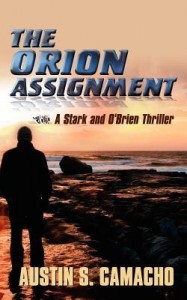
Austin: Wow! The best part – hmm…that’s a tough question to answer. On the one hand I really love the process of creating new human beings. And that’s what those characters are to me. They’re real people to me. And I really enjoy creating them, setting them into a setting and watching what they do and how they respond and how they react to things. I get a kick out of that. On the other hand I equally love the experience of meeting with readers and meeting with fans and talking to them about my work. I love hearing from fans what they liked or didn’t like and that’s one of the reasons I do so many personal appearances.
Norwood: And I know, it’s interesting to hear when you talk to your fans because sometimes they have – they bring a different twist. They have different ideas than your book, which makes your appreciation of your work even greater. You’ve been writing now for well over a decade, how have you grown as a writer?
Austin: Wow! I think in a couple of ways. One thing is once I was putting books out there for people to look at I became more critical of my work. And so I have hit the books in effect. I have studied the craft. And everybody that’s good at fiction you got to have a certain amount of talent but you also have to master your craft. And I have really worked at that. The other thing is I have broadened my writing. I started out just writing this private eye. I wrote three or four Hannibal Jones novels in a row and they kept getting darker because the world he lived in was effectively out here in the real world. So I took a turn from that and moved off and started writing the Stark and O’Brien novels which are a bit lighter. They’re a little more Indiana Jones, if you will a lot of action but it’s not the kind of hard hitting gritty violence that you find in the detective stories. And that has allowed me to broaden my style a bit.
Norwood: That’s a good segue for my next question, which I think you already write it. And the question is what advice do you have for aspiring authors? And I think you hit the nail on the head when you said study the craft. I think that’s very important.
Austin: I also think that everything that we humans do we get better with practice. So the first thing I tell writers is write every day, write something every day if you’re going to write a blog or a short story or whatever but you got to keep working those writing muscles. And yeah, study. If you haven’t ready Stephen King’s book on writing you’re not really ready to create fiction as far as I’m concerned. And there are three or four other books that you just need to have gotten through and take some classes. I teach at Anne Arundel Community College, a couple of writing courses, very specific, narrow ones on dialogue, on character, go hear what writers are saying. And don’t forget that you need to be part of a writing community. So a tenth conference – I’m on my way to the Love is Murder Conference right now but it’s good to attend conferences where there will be writers and readers around you that you can learn from and who knows, maybe they can pick up some things from you.
Norwood: Okay. So what do you have on the burner for the next year? Is there another book?
Austin: Well, as a writer I am hip deep in the next Hannibal Jones mystery working on that, and a couple of short stories that I’ve promised people. But that’s only one side of my writing life. I am fortunately attending conferences. I have helped to form Intrigue Publishing, a new publishing concern. So I’m reading submissions as well. And of course, my team and I are putting together the creatures, crimes, and creativity literary conference which will be in Baltimore September 13th, 14th, and 15th where we will gather writers and readers of genre fiction for our own conference. And I hope that lots of folks will join us there. We’re going to have a good time.
Norwood: I hope you’re right because I’m also participating in that conference.
Austin: Yeah, so people will be able to come and see you, hear you on a panel talking about some side of the writing life. And that alone will be worth the price of admission.
Norwood: Absolutely! Now, where can people – where can readers purchase your books?
Austin: Oh wow! Well, of course, you can get any of my novels at just about any bookstore, walk into Barnes & Noble and if you don’t see me on the shelf for goodness sake tell them to order a couple. But if you’re less patient than that, of course, they’re all available on Amazon.com. If you have a kindle you can download them all onto the Kindle. Just about anywhere you can get a good book you can get my book. And if you ever have a question about that you can come hit me up on Facebook. In fact, please find me on Facebook; check out my website at www.ascomacho.com. Tweet me, I’m on Twitter. In fact, you know what, just Google me. I’m all over the internet now.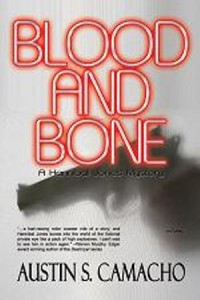
Norwood: Yes, you have a very strong internet presence, and we’re running out of time, but there you have it: Austin S Comacho, adventure novelist. Check out his fast paced suspenseful mysteries and thrillers. I guarantee you’ll be enthralled with his fine form of reading entertainment. And to learn more about the author and his work check out his website www.ascomacho.com. Thank you Austin.
Austin: Thanks much for having me Norwood.
‘My Two Uncles’ a significant primary reader
January 17, 2013
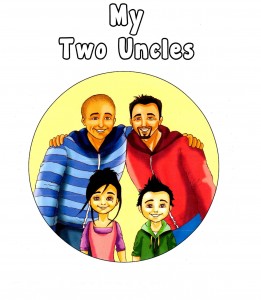 My Two Uncles, an easy reader by Jeff Rivera captures the love, acceptance and understanding a nephew and niece finds with their gay uncle and his partner. Jeff Rivera takes on the socially contentious issue of gay parenting recognizing that growing up with an openly gay uncle is an increasingly common experience. Even Honey Boo Boo lovingly refers to her uncle Lee Thompson as “Uncle Poodles.” Exquisitely illustrated it’s an uncomplicated story of the daily care and protection found in the Uncles’ love.
My Two Uncles, an easy reader by Jeff Rivera captures the love, acceptance and understanding a nephew and niece finds with their gay uncle and his partner. Jeff Rivera takes on the socially contentious issue of gay parenting recognizing that growing up with an openly gay uncle is an increasingly common experience. Even Honey Boo Boo lovingly refers to her uncle Lee Thompson as “Uncle Poodles.” Exquisitely illustrated it’s an uncomplicated story of the daily care and protection found in the Uncles’ love.
There is a current scientific thought that homosexual men may be predisposed to nurture their nieces and nephews as a way of helping to ensure their own genes get passed down to the next generation. Studies suggest these uncles have avuncular tendencies and are significantly more altruistic toward their nieces and nephews than straight uncles. Whatever these studies go on to document there is little question the gay Uncle can play a significant role in a child’s development and outlook.
My Two Uncles may be a significant primer in answering a beginning reader’s curiosity about the non-traditional family. Children come into the world without prejudices though understandably questions will arise. Books like My Two Uncles keep the explanations simple in clearing up the confusion and opening the mind to understanding.
I highly recommend My Two Uncles not just for the beginning readers of gay parents, uncles and aunts but all because it teaches universal notions of love, acceptance and understanding.
A review of Keith Thomas Walker’s ‘Dripping Chocolate’
December 29, 2012
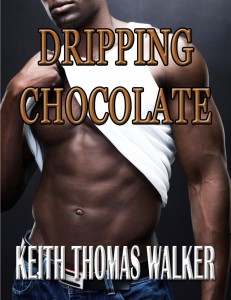 Keith Thomas Walker’s Dripping Chocolate is a romantic tale with an urban twist. The characters are not your usual upper crust lovers living fantastic lives in ideal settings coping with a complex complicated love. The characters are true to form working class single parents making it in the world. Nicole, a mother of three, works in a call center where her coworker girlfriends make up her supportive social circle. Charles Dwayne Hester is only months out of the joint taking on the challenges of an ex-con seeking employment while resisting the street’s lucrative drug hustle. Determined to go “legit” Charles is forced to rely on his money making assets, a handsome face and a well endowed muscular body. Charles is reluctantly drawn into stripping because of his desire to be a good father and the responsibility of two kids and twice the baby mama drama.
Keith Thomas Walker’s Dripping Chocolate is a romantic tale with an urban twist. The characters are not your usual upper crust lovers living fantastic lives in ideal settings coping with a complex complicated love. The characters are true to form working class single parents making it in the world. Nicole, a mother of three, works in a call center where her coworker girlfriends make up her supportive social circle. Charles Dwayne Hester is only months out of the joint taking on the challenges of an ex-con seeking employment while resisting the street’s lucrative drug hustle. Determined to go “legit” Charles is forced to rely on his money making assets, a handsome face and a well endowed muscular body. Charles is reluctantly drawn into stripping because of his desire to be a good father and the responsibility of two kids and twice the baby mama drama.
The story opens with Nicole—not without her own baby daddy drama–coming to the realization that her recent relationship with Byron isn’t working. He’s controlling and jealous and as advised by her girlfriends potentially dangerous. She breaks it off but Byron can’t seem to take go for an answer. To celebrate her 29th birthday girlfriends treat Nicole to a night out at Peeping Jane, a male strip club. Nicole shuns the idea of male strippers. Exciting and easy on the eyes she considers them undesirable and full of no class baggage.
Enters Dripping Chocolate his first night on the job stripping; learning the ropes and making plenty of money. Nicole gets a special dance and the encounter remains engrained in her memory. Shortly thereafter she bumps into Dripping Chocolate aka Charles at the Walmart while both are shopping for their respective sons. Her new perception of Dripping Chocolate as a responsible father dramatically changes Nicole’s first impression.
With cold feet she resists his overtures while considering her girlfriends’ conflicting advice. Nevertheless she dives into irresistible waters, but soon finds swimming in the budding romance a challenge. The plot thickens with heightened conflict when Charles’ stripping becomes the elephant in room.
Conflict is the key to Keith Thomas Walker’s string of successful novels. The author is a master of what literary agent Donald Maass calls micro-tension, the literary device designed to keep readers turning pages. While Dripping Chocolate is a romance it’s no fantasy dream but chocked with common real life urban struggles. Through sublime dialogue Walker’s characters jump off the page vivid and real. In great writing the plot is layered with conflicting relationships taken to dramatic heights. I highly recommend Dripping Chocolate.
You can listen to my in depth interview with the author on my blog EditorialIndependence.com.
Surviving Cancer: keeping laughter and faith in high gear
November 27, 2012
Having never met Fred Evans face to face, I know we share one degree of separation. Beyond the fact he graduated from my beloved alma mater three months before I entered, reading his book I immediately felt a connection like the lifelong buddy down the street. That connection came personified and magnified in Surviving Cancer: Keeping Laughter and Faith in High Gear. Fred Evans chronicles his experience coping and overcoming a life threatening health crisis in a way so deeply personal and endearing, readers will find themselves laughing, crying, and comforted by his words.
It is a must read particularly for those facing similar circumstances, patients, caregivers and relatives. And let’s face it, few of us will go through this life without knowing someone who has or will battle the dreaded disease. In Fred’s case it was prostate cancer. Most men diagnosed with prostate cancer do not die from it, and in fact, more than 2.5 million men in the United States who have been diagnosed with prostate cancer at some point are still alive today.
However, the statistics among African American men are less favorable as they are more likely to be diagnosed at an advanced stage, and more than twice as likely to die of prostate cancer as white men. Prostate cancer occurs less often in Asian-American and Hispanic/Latino men than in non-Hispanic whites. The reasons for these racial and ethnic differences are not clear.
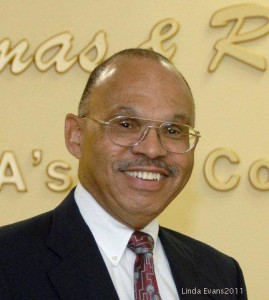 Fred Evans beat the odds. In his business career, Fred worked for 30 years in the financial division of Eli Lilly and Company, a global pharmaceutical company. For 15 of those years he served as a Department Head. During his career he worked on the corporate audit staff which included international audits in England, Spain, Switzerland, Venezuela, and Brazil. Additionally, he served as the Financial Analyst for Eli Lilly affiliates in Argentina and Chile. It is perhaps his avocation as an avid cyclist that brings him the greatest satisfaction. Much to his credit it also figured prominently in the battle providing a physical armor of stamina and strength necessary for fighting the disease as well as a support network sustaining his mind, body, and spirit.
Fred Evans beat the odds. In his business career, Fred worked for 30 years in the financial division of Eli Lilly and Company, a global pharmaceutical company. For 15 of those years he served as a Department Head. During his career he worked on the corporate audit staff which included international audits in England, Spain, Switzerland, Venezuela, and Brazil. Additionally, he served as the Financial Analyst for Eli Lilly affiliates in Argentina and Chile. It is perhaps his avocation as an avid cyclist that brings him the greatest satisfaction. Much to his credit it also figured prominently in the battle providing a physical armor of stamina and strength necessary for fighting the disease as well as a support network sustaining his mind, body, and spirit.
The role of friends and family cannot be overestimated. Fred has the benefit of a loving caring wife, Linda, his once nursery school classmate, and high school as well as college sweetheart. He calls her his angel and she is right there beside him on every turn of the journey. Fred would endure the full cancer fighting strategy of surgery, chemotherapy, radiation and hormone therapy. There would be many physical challenges and side effects from uncontrollable hiccups, the chills, farting, and fatigue to peeing hot sauce. Fred, like a well conditioned warrior, soldiered through it all with an athletic endurance acquired through his cycling. His love of cycling plays a big part in his life. He served as a past President of the Central Indiana Bicycling Association having cycled over 170,000 miles.
Perhaps the greatest component of his journey and conquest is the state of grace that carries him through it all. Fred Evans shares the travails of his illness and recovery with ease and an incredible sense of faith and humor that makes this book an inspirational companion not just to those facing the battle but to their partners, friends, relatives, and lovers. The conversational tone is friendly and from the heart much like talking to a close friend—my buddy down the street. Surviving Cancer: Keeping Laughter and Faith in High Gear inspires so much hope and with five stars I recommend it highly.
Book clubs take on a dynamic function for independent publishers
October 23, 2012
I recently attended The Reading Divas Black Authors and Readers Rock Weekend an event bringing together writers and book clubs. As a writer I had the opportunity to introduce myself and my works to hundreds of new readers. It was also an opportunity to network with other authors and share marketing strategies.The participating clubs came from both near and afar with snappy names like Just Us, Sugar and Spice, Nooks, Books and Friends, and Body and Soul. Book clubs are no longer just readers coming together to discuss popular literature, but now take on a more dynamic function within the publishing industry. The decline of brick and mortar bookstores, offering popular book signing venues where fans met their authors, are being alternatively replaced with the intimate book club setting serving as an increasingly important marketing and distribution channel.
The weekend began with a Friday night reception and open club meeting featuring a discussion led by Karen Quiones Miller of her new book An Angry Ass Black Woman and a reading by the popular legal thriller author Pamela Samuels Young from her new novel Attorney-Client Privilege. The program was standing room only as were the four Saturday morning workshops and panel discussions which included: Is Urban Lit Really Literature, So You Wanna Write, What Impact has the Ebook had on Black Publishing, and How to Start, Improve and Get the Most Out of Your Book Club. All in fun there were raffles for attendees and a fashion contest for the best dressed club. Select clubs paraded through the banquet hall donning identifying distinctive outfits from custom tops and scarves to cable stitch sweaters.
The event highlight came when keynote speaker New York Times best selling author Mary Malone took the floor sharing her remarkable writing journey entertaining her spellbound audience with her compelling biography. Her first novel, The Upper Room was published by St. Martin’s Press in 1985. She is best known for her novel, God Don’t Like Ugly (originally published by Dafina Books in the fall of 2000), and the series revolved around the characters first introduced in this book. Her latest is God Don’t Make No Mistakes.
Pamela Samuel Young told how through a book club appearance she landed a guest spot on the The Monique Show. Many authors appreciate that one on one face time with their readers many of whom do not hold back on their criticism. The authors and guest book club members frequently expressed how valuable they found the event praising the The Reading Divas. Many are looking forwarding to next year’s event expecting it be an even bigger and better event.
TaNIsha Webb author of The Ultimate Book Club Experience and founder the Book Club University is a great source for both authors and book clubs.

